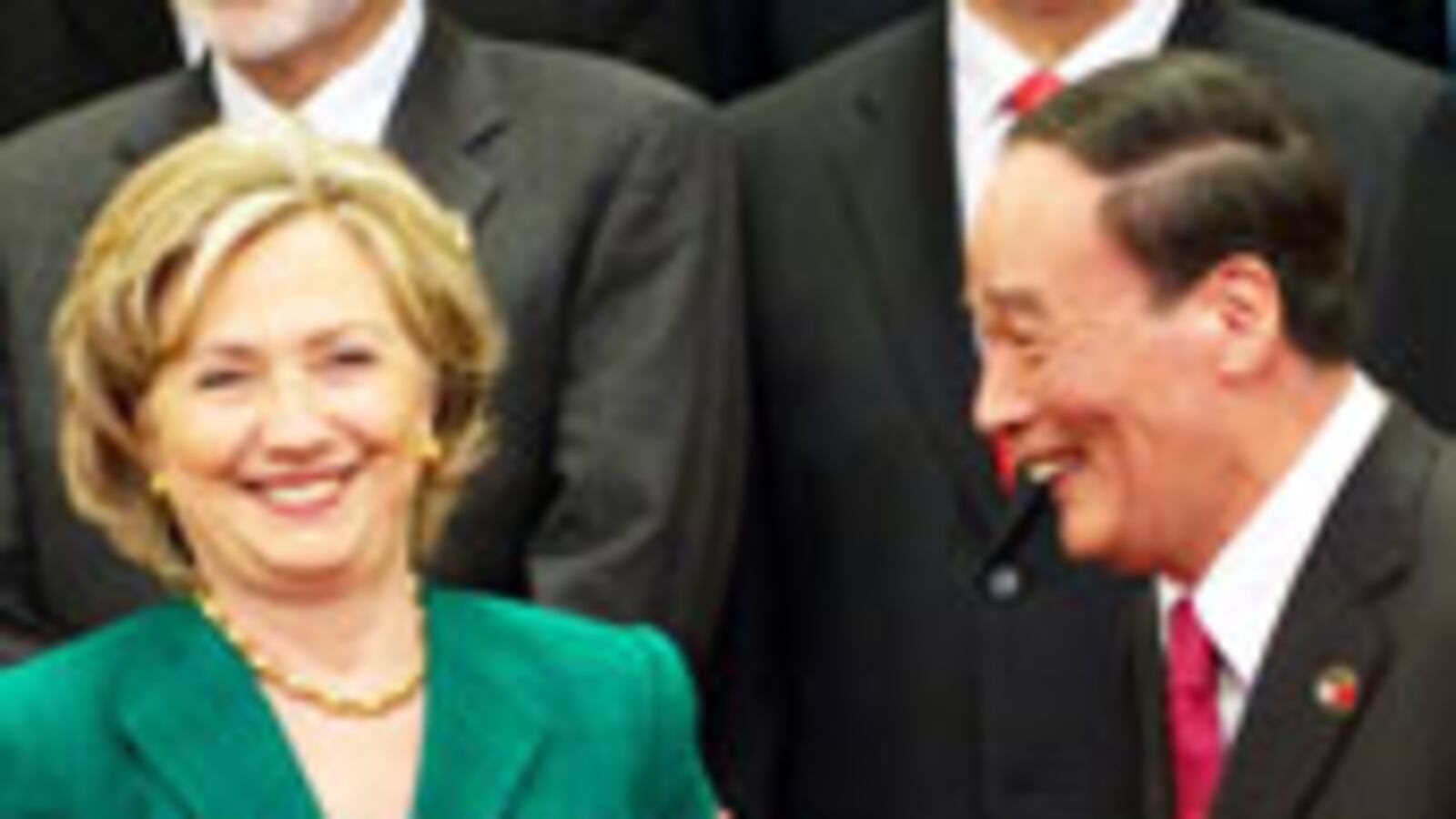
BEIJING—Among the Chinese, Secretary of State Hillary Clinton, is known as lihai, a compliment of sorts, which translates roughly as "fierce" or "severe."
But when it comes to China, Clinton seems to have learned that fierce isn’t always useful.
Patience is a more effective virtue.
This week, Clinton and about 200 American officials, including Treasury Secretary Timothy F. Geithner, Federal Reserve Chairman Ben S. Bernanke and Adm. Robert F. Willard, commander of U.S. forces in the Pacific, concluded at weeklong trip to Asia.
The sizeable delegation left Beijing with several deals and memorandums of understanding under their belts, proving that both the U.S. and China have learned important lessons in negotiation.
For those used to the lightning speed of events chronicled on the American 24-hour news schedule, negotiations with China moved at a glacial pace. And in a country where decisions are made behind closed doors and very little information trickles out from the halls of power, those who get paid to read the tea leaves said that—despite the growing tensions on the nearby Korean peninsula—the second annual Strategic and Economic Dialogue concluded much as everyone expected.
As Xinhua, China’s state-run news agency declared: "A single meeting cannot resolve all existing differences.”
This may not be the type of success the Obama administration was hoping to declare to reporters, but Washington knows—especially following the Copenhagen debacle—that trying to rush the Chinese only gives them more leverage. So the Americans are taking it slowly, knowing that long-term victories are worth the trade-off if they want Beijing's timely cooperation on, say, Iran and North Korea.
And in fact the sizeable delegation left Beijing with several deals and memorandums of understanding under their belts, proving that both the U.S. and China have learned important lessons in negotiation that will shape bilateral relations for years to come, notwithstanding Kim Jong Il's latest machinations.
"Anything that builds trust is positive," says Alistair Thornton, a Beijing-based analyst with the research firm IHS Global Insight. "You can’t shove all these people in a room and expect results to pop out. That's not the way diplomacy works, and certainly not with China."
Clinton landed in China undoubtedly knowing these talks were just the latest step in a long slog of negotiations on a series of issues on which the Americans and Chinese have very different concerns. And the Americans appear to have learned that demanding too much only makes any triumphs appear small.
"While it looks like the Americans are making compromises, in fact they have just stopped asking for things they were never getting from China under prior administrations," says John Delury, associate director of the Asia Society’s Center on U.S.-China Relations. "Flogging the human rights issue wasn’t very effective at making China change, so by taking it off the table, the Americans in a weird way have taken back the leverage they were inadvertently giving China over other issues.”
Those issues now include the value of China's currency, the yuan, which the Obama administration would like to see raised in order to make American exports more competitive. While no announcements were made this round, it appears Treasury Secretary Geithner backed off on exacting further pressure because the Chinese have stated the currency revaluation will happen, which would vindicate Washington's slow-burn approach.
Clinton's team also succeeded in winning concessions on another major American concern. When Beijing announced new Chinese procurement rules last November that gave priority to intellectual property developed, owned and registered in China, the American business community went apoplectic, lambasting China's indigenous innovation policies for shutting out U.S. companies and turning its back on prior free-trade commitments. This week's talks yielded a retreat from Beijing, with Chinese officials claiming the procurement rules have been modified. In return, Beijing is hopeful the U.S. will relax controls on high-tech exports to China.
But these accomplishments were largely overshadowed by Seoul's accusation that Pyongyang was behind the sinking of a South Korean warship in March that killed 46 sailors. With tensions at their highest in decades on the Korean Peninsula, both Washington and Beijing are scrambling to avoid further escalation with Kim Jong-Il.
While the U.S. would prefer China-supported sanctions against the rogue state and, in the realm of fantasy for the time-being, a democratic, unified Korean peninsula, the Chinese are taking a vastly different tack toward their Communist neighbor. Long obsessed with maintaining stability in the country and region—the Chinese government's winning recipe for economic success and domestic political legitimacy—Beijing is willing to do whatever necessary to avoid a Korean war. Any major conflict there could propel millions of starving North Korean refugees across the border into China.
Likewise, a war could bring the 28,500 American troops currently stationed in the South right to the Chinese border. So maintaining a buffer zone ruled by the Kim dynasty satisfies all of Beijing's concerns. Yet the Americans understand that Beijing and Pyongyang are not as close as it would appear. "It's often portrayed that China and North Korea are best mates but that's not true," says IHS Global Insight's Thornton. "Privately the Chinese are fuming. The last thing they want is for North Korea to get hostile, which would destabilize trade and possibly lead to Japan going nuclear—China's worst-case scenario."
The official Chinese line lauds the close Sino-American relationship as one in which the two countries' interests are "more intertwined than ever," but a darker sentiment lurks just beneath the surface here. Beijing is still seething over Washington's sales of arms to Taiwan and Obama's meeting with the Dalai Lama, and feels the U.S. must pay for these sins at the negotiating table.
“Chinese people's interests are no less important than those of Americans,” barked an editorial in the Global Times, another Chinese propaganda outlet, following Clinton’s visit. “They are no less courageous than Americans in voicing their desires to protect those interests, either.”
In light of this rivalry, Clinton's shrill demand that China back punishing North Korea—on whose side China fought in the Korean war—has been met with deep skepticism by many Chinese. They resent the American presence in Asia and still harbor deep distrust toward the U.S. government. To some of the Chinese people, the latest Korean incident reeks of a plot by an insecure superpower squeamish with China's rising global clout.
To witness, the Chinese blogosphere is ridden with anti-American articles parroting North Korean propaganda:
"The so-called evidence is incomplete and the United States Secretary of State Hillary Clinton must respect the facts, respect science, respect knowledge, respect the Korean peninsula and all the people of this region,” reads one blog. The author goes on to posit that the entire crisis has been crafted by the Obama administration to “contain China,” with South Korea “just a puppet” in the latest geopolitical game.
Whether a suspicious Beijing will sign on to Clinton's calls for further sanctions on North Korea is an open question, but observers stress patience when judging the Obama administration's China strategy as a whole.
"To expect the Chinese to turn on a dime and come to a quick conclusion based on Clinton being their for a short period of time is setting the bar too high," says Richard C. Bush III, an expert on U.S-China relations and senior fellow at the Brookings Institution. "She was laying the groundwork in a very intensive process that's not designed to achieve specific results by the time these meetings are over."
Dan Levin is a Beijing-based journalist who has written for The New York Times, New York magazine, Forbes, the International Herald Tribune, and Monocle, among other publications.




